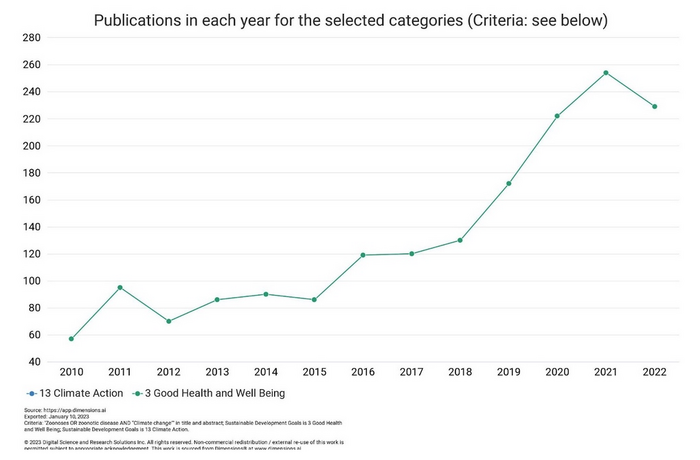Whether it’s diseases from bats, birds, pigs, or mosquitoes, climate change brings with it an increased risk of animal-borne (or “zoonotic”) diseases that can transmit to humans.

Credit: Digital Science / Dimensions.
Whether it’s diseases from bats, birds, pigs, or mosquitoes, climate change brings with it an increased risk of animal-borne (or “zoonotic”) diseases that can transmit to humans.
Digital Science, a technology company serving stakeholders across the research ecosystem, has today released its analysis of the global research response to climate change and zoonotic diseases, in the context of the United Nations’ Sustainable Development Goals (SDGs) on climate and health.
Using data from Dimensions, Dr Briony Fane, Ann Campbell and Dr Juergen Wastl from Digital Science have explored published research, research funding, policy documents, and citation data. Using Google BigQuery (GBQ), they also integrated data from Dimensions with one of the publicly available World Bank datasets.
The authors have highlighted global disparities in funding for research, research collaborations, and recognition for research based on geographical and socio-economic location.
They write: “What is apparent is that governments around the world are investing large sums of money as part of the global mission to halt the spread of animal diseases and to protect the public against zoonotic disease outbreaks before they become pandemics that pose a risk globally.
“Many of the health impacts associated with climate change are a particular threat to the poorest people in low- and middle-income countries where the burden of climate sensitive diseases is the greatest.”
Their findings highlight:
-
Research publications in the fields of zoonotic diseases and climate change have increased more than two-fold since the implementation of the SDGs in 2016.
-
The representation of low-income country researchers in these fields of research is 40 times greater than high-income country researchers.
-
Government organisations and non-profit agencies in the Global North (broadly speaking, developed nations) award much of their funding for research in these fields in the Global South (developing nations).
-
Research collaboration patterns reveal that researchers in Global South countries are more likely to collaborate with researchers in the Global North than vice versa.
-
Despite being strongly represented in these fields, research carried out on zoonotic diseases and climate change in lower income countries is less well cited by higher income countries.
See the full analysis on the Digital Science website.
About Dimensions
Part of Digital Science, Dimensions is the largest linked research database and data infrastructure provider, re-imagining research discovery with access to grants, publications, clinical trials, patents and policy documents all in one place. www.dimensions.ai
About Digital Science
Digital Science is a technology company working to make research more efficient. We invest in, nurture and support innovative businesses and technologies that make all parts of the research process more open and effective. Our portfolio includes admired brands including Altmetric, Dimensions, Figshare, ReadCube, Symplectic, IFI CLAIMS Patent Services, Overleaf, Ripeta, Writefull, and metaphacts. We believe that together, we can help researchers make a difference. Visit www.digital-science.com and follow @digitalsci on Twitter or on LinkedIn.
Media contacts
David Ellis, Press, PR & Social Manager, Digital Science: Mobile +61 447 783 023, [email protected]
Simon Linacre, Head of Content, Brand & Press, Digital Science: Mobile: +44 7484 381477, [email protected]




